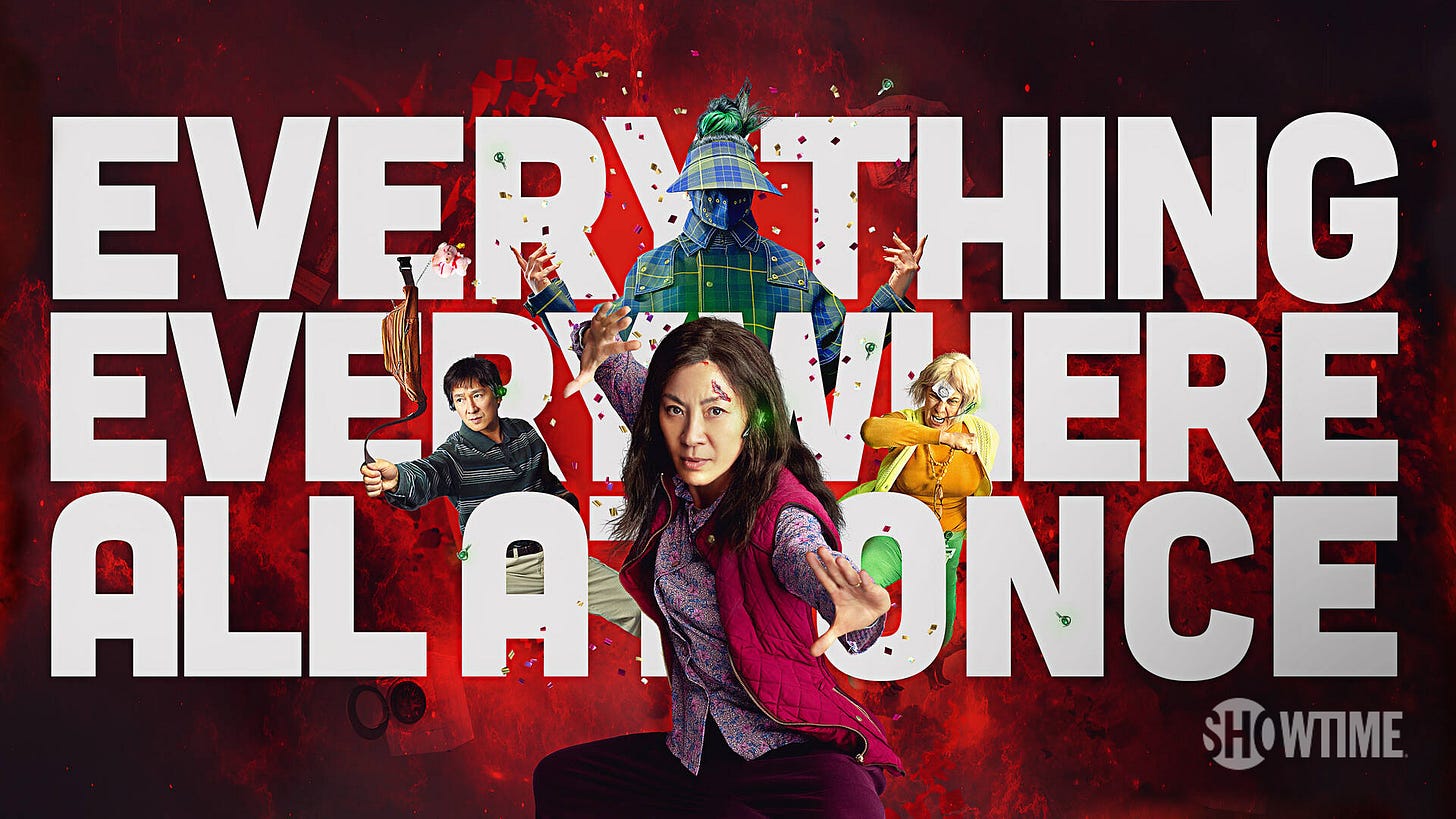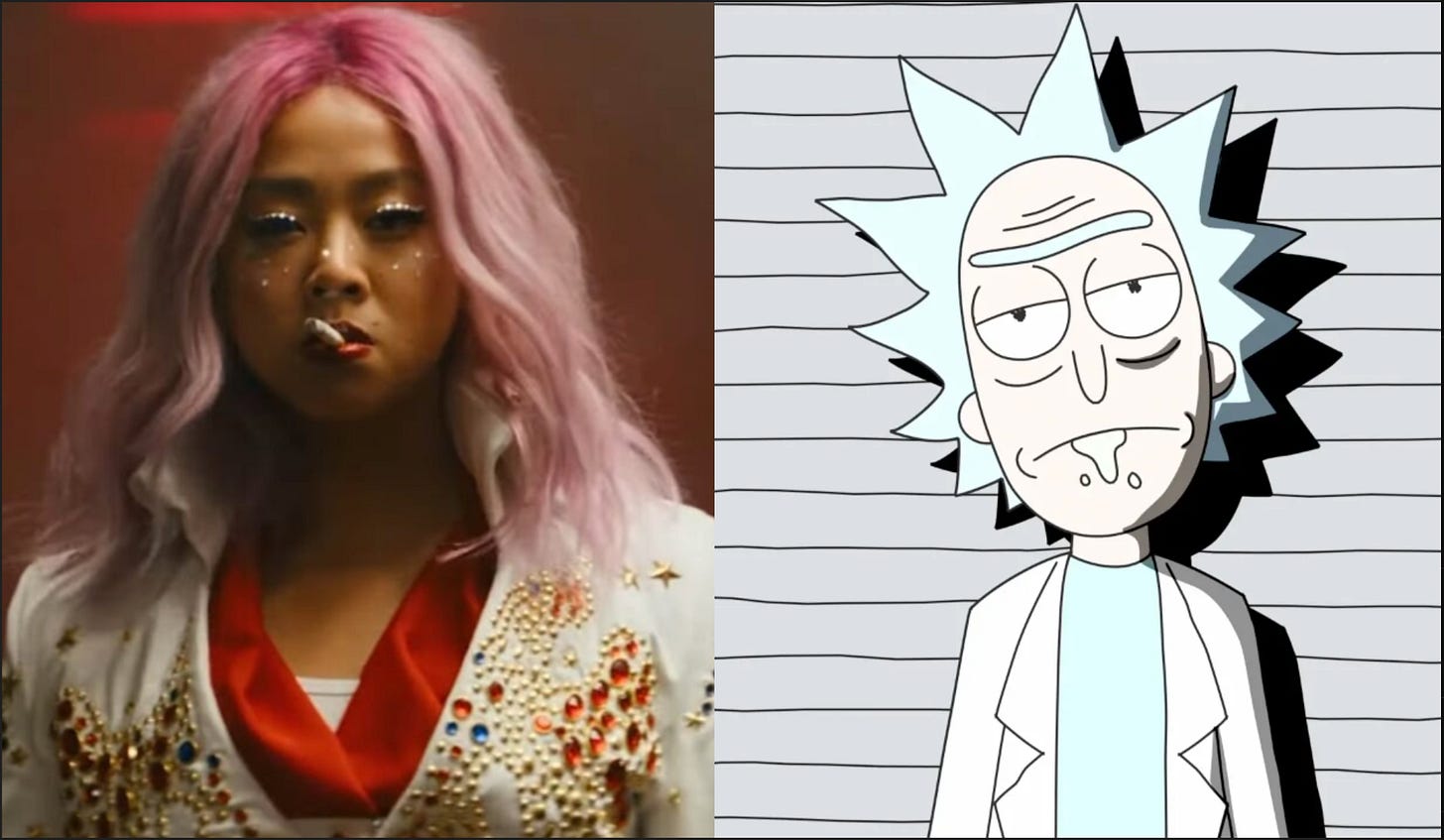Everything Everywhere All At Once - Integrating Nihilism
Why did EEAAO hit me so hard?
Everything Everywhere All at Once resonated with me — deeply. The climax kept me crying for more than 10 minutes. It was like the movie had me in an emotional chokehold and was squeezing the pressure point. Reflecting now, I see the movie as a beautiful dramatization of my internal battle with nihilism. And the cult popularity of the movie hints it isn't just me; perhaps you battle too.
The Making of Jobu
The legend of Jobu begins when some scientists discover a way to connect your mind to another version of yourself in the vast multiverse. But when the best "verse jumper" is pushed too far, her mind "shatters," overwhelmed by experiencing all the universes simultaneously. Jobu Tupaki has "seen too much [and] lost any sense of morality, any belief in objective truth."
Like Jobu, I too sought truth and power, leading me to dive too deep into the cynicism and nihilism of Nietzsche and Robin Hanson. I asked why one too many times and learned the truth.
“What's the truth?” - Evelyn
“Nothing matters.” - Jobu
While nihilism presents as a factual claim about reality, it is more a ~vibe~, an emotional stance towards the world. As nihilism creeps into your headspace, it whispers into your ear throughout the day, "this... doesn't... matter" — not your friends and family, hopes and dreams, or ads on Craigslist. It disconnects you from any experience of meaning and connection and manifests a cold and empty world.
In a way, this film glorifies Jobu, the creature of nihilism, portraying her as an "omniversal being with unimaginable power." Nihilism is cast as the natural result of too much knowledge and power. It's like Rick and Morty where the most intelligent, powerful guy in the multiverse is a nihilistic, selfish asshole.
Like EEAAO, Rick and Morty's portrayal of blatant nihilism is particularly popular with the 18-34 year-old demographic. Its philosophy is summed up when Morty tells Summer, "Nobody belongs anywhere, nobody exists on purpose, everybody's going to die. Come watch TV".
Both of them are so popular because they strike something real. They both play with the multiverse as a dramatization of the overwhelming number of different perspectives we come into contact with, all serving as subtle questions to our values and understanding of the world. The directors of EEAAO compare the jarring jumps around the multiverse to our experience of the internet, where you doomscroll through more worldviews and ideas in a day than a hunter-gatherer experienced in their entire lives. This movie viscerally captures this feeling of the underlying, destabilizing chaos and absurdity of modern life.
The Nihilists Search
So nothing matters; now what? Jobu uses her power for her own amusement, reveling in the absurdity of life. But she hasn't actually resigned herself to meaninglessness or pure hedonism yet. She has a goal: she is searching for someone.
"I wasn’t looking for you so I could kill you. I was just looking for someone who could see what I see. Feel what I feel." - Jobu
This was the first moment in the movie where I cried; it resonated with something in me.
Like Jobu, nihilism didn't cause me to collapse into nothingness and hide the unpopular, depressing nihilistic view. Other people seem motivated and happy. Everyone seems to believe X or Y goal is worth pursuing. Perhaps they knew something that I didn't. I would lecture friends and strangers about my cynicism and nihilism, secretly hoping someone saw something I didn't. No one did. The most promising response from optimists seemed to be a naive indifference to the question. "I don't think about that," they would say.
“A part of me hoped you’d see something I didn’t. That you would convince me there was another way.” - Jobu
Anyone who tried to argue hadn't spent as much time thinking about it as I had. I was too well prepared. And when I did find a few people or books that knew exactly what I was talking about, they had even less hope for finding a way out than me.
“Every deep thinker is more afraid of being understood than being misunderstood. The latter perhaps wound his vanity; but the former wounds his heart, his sympathy, which always says: ‘Ah, why would you also have as hard a time of it as I have?’”
Beyond Good and Evil by Friedrich Nietzsche
An Antidote
If Jobu embodies the descent into nihilism, then Waymond is the aspiring optimist in me. Like all the indifferent optimists I talked to, he seems childlike and naive, avoiding difficult realities. But they just weren't articulating it like Waymond does:
"When I choose to see the good side of things, I'm not being naive. It is strategic and necessary. It's how I've learned to survive through everything. I know you see yourself as a fighter. Well, I see myself as one too. This is how I fight." - Waymond
Underlying this belief is an acceptance of reality. Yes, life is suffering—indisputable. But the real question is: what do you do about that?
I know you're all fighting because your scared and confused. I'm confused too. All day, I don't know what the heck is going on. But somehow it feels like it's all my fault. I don't know. The only thing I do know... is that we have to be kind. Please... be kind... especially when we don't know what's going on. - Waymond
In Waymond, we have two ingredients for the antidote: a strategic, unyielding optimism and kindness that rejects disconnection and resignation.
And in this internal conflict between nihilism and optimism, the mediator is my sense of self embodied in the main character, Evelyn. Only she can integrate both these perspectives, as Jobu would never listen to Waymond—they don't even speak the same language.
And Jobu is soooo done.
“I’m tired. I don’t want to hurt anymore. And for some reason when I’m with you it just hurts the both of us." - Jobu
In the climax, Jobu tries to commit blackhole-assisted suicide, but Evelyn stops her. Jobu angrily asks Evelyn her fundamental question, "Out of all of the places I could be, why would I want to be here with you? … So what, you just gonna ignore everything else, you could be anything, anywhere." In other words, in a world where nothing matters because any worldview or world is possible, why should you care?
EEAAO hits on an answer, but I think it’s best answered by an old episode from House that resonated with the same part of me.
If you don't know the hit show House, it’s a hospital drama following House, another troubled witty asshole genius, who leads a team diagnosing difficult medical conditions. In the episode One Day, One Room, House discovers his new patient was raped and quickly hands her off, but she refuses to be treated by anyone else. House was just the random doctor on staff that day and angrily asks her "You gonna base your whole life on who you get stuck in a room with?" and she responds "I am gonna base this moment on who I’m stuck in a room with. That’s what life is, it’s a series of rooms. And who we get stuck in a room with adds up to what our lives are."
And here we have the final piece of the antidote: care about the people you end up in the room with, care about the particular way your life turns out and the particular things in it. Why? Because that's what your life is and it’s specifically yours. You could be anything, anywhere, but you should mentally stay at the strategic level of analysis that creates the deepest sense of meaning. This isn't a philosophical argument offering the scientific, universal, verifiable truth we often demand, but a practical, emotional antidote for you in particular against all the noise in our modern environment.
Some people will say this take is just optimistic nihilism or existentialism, where although nothing may matter in an absolute sense, you can create your own meaning. But I am making a stronger claim. The undertone of optimistic nihilism mixed with our culture’s hypertolerance is the idea that you personally get to choose what you believe and all perspectives are somehow equally valid. In a way, it's a strong assertion about the inherent value of individual desire and a rejection of grander value systems like honor, duty, love, and responsibility.
But I am saying you CAN'T choose anything. All goals are NOT equally valid. What if my goal was to shit in every Thai restaurant in NYC or turn myself into a pickle? That is a bad goal and we should say it’s a bad goal. You should SHOULD be kind and you should SHOULD be optimistic. This is an objective moral claim pointing at real boundaries of what is worth doing in our current world. While different future and past environments may require a different worldview, the virtues offered here are fairly universal now. You could argue the movie doesn't say that and it’s actually about healing Asian immigrant intergenerational trauma or love and relationships as the core of meaning, but I'm just saying what I saw. Something resonates because it strikes something in you, and this movie resonated with me. In other words, if you're reading this, it’s for you. So what do you see?
"You search outside of yourself to search within yourself, knowing that everything you find has always been a part of you"
Building a Second Brain by Tiago Forte



